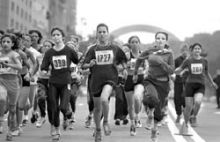The Sunday before last there was no room to swing the proverbial cat in Kyiv’s Maidan Nezalezhnosti. This is no wonder as it has been a long time since Kyiv last witnessed such a democratic sporting event. Running down the main thoroughfare turned race track were Health Care Minister Vitaly Moskalenko, US Ambassador to Ukraine Carlos Pascual, tennis ace Andriy Medvediev, and rank-and-file employees and students. Two minutes earlier, participants in wheelchairs set off to cover the three-kilometer distance from Maidan to Leo Tolstoi Square. The race drew no less than 4,000 runners sporting white T-shirts with the same emblem on the back and red ribbons pinned to their chests.
Such a mass Sunday gathering was in support of those living with HIV. Proceeds from charitable contributions made by participants of the race with a symbolic name, For the Sake of Life, will be turned over to Kyiv’s Pecherska Lavra Monastery of the Caves for the repairs of the hospital offering treatment to persons suffering from AIDS.
Impressive as it was, the event was evidence that modern techniques of influencing people’s consciousness, heretofore employed only in political campaigns, were used for the noble purpose of solving pressing social problems.
Experts’ estimates show there are about 400,000 HIV-positive individuals residing in Ukraine. Over the past two decades AIDS has claimed the lives of 20 million people the world over. A recent study in Zambia has shown that incomes dwindled by 80% in two- thirds of households that lost one breadwinner who had died of AIDS. Coupled with other problems endemic in this country, AIDS could precipitate a food crisis or even famine. UN representatives in Ukraine recall that when the leaders of African states were alerted to the fact that AIDS would not only restrain economic growth but each year would impact on the well- being of the people, they would not listen, saying they had more important matters to attend to.
Limbering up for the race, Dutch Ambassador to Ukraine Monique Frank said that owing to coordinated efforts the HIV/AIDS incidence and mortality rates in Holland are the lowest in the EU. Carlos Pascual, running under number two, said that, unfortunately, he knows full well the consequences of this problem if it tends to be relegated to the background. Andriy Medvediev, another ambassador of goodwill striving to fight AIDS, decided to save his verbal effort and promised that the following day he would donate blood and suggest that his friends follow suit.
However, many of those registered for the race, who made contributions of 20 and 10 hryvnias for adults and students respectively, did not deign to run and put their physical capabilities to test. For instance, although Valentyna Dovzhenko, chair of the State Committee on the Family and Youth, admitted jogging a mile in the morning, she refused to show off her physical shape. Instead, she and the competition referee greeted runners and walkers at the finish line. Meanwhile Health Minister Vitaly Moskalenko not only covered the whole distance, but also was among the first to finish. Before the race he confessed that he wanted to run not only because it was his ministerial duty to show support for people living with HIV and to take all possible measures to curb the spread of this disease but also to recall his youth. Incidentally, in his own time he was a champion of Ukraine in race walking.







